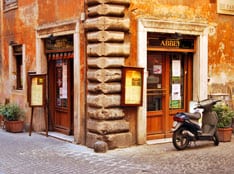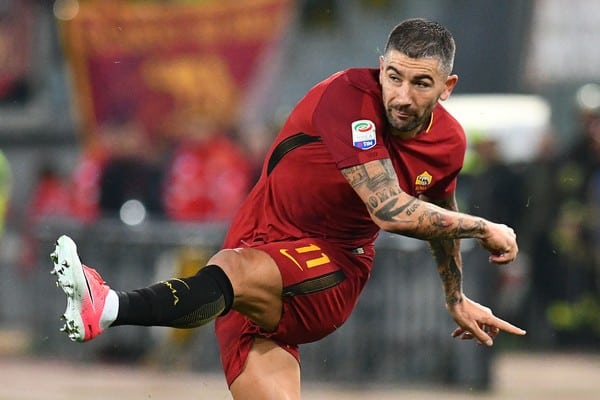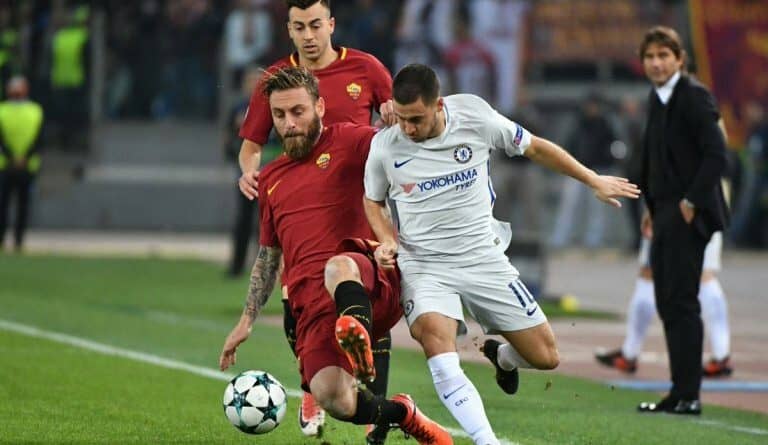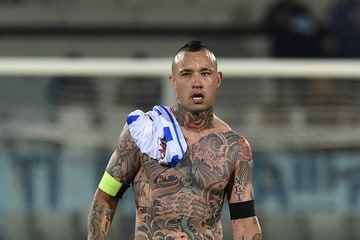AS Roma bringing joy to this once doomsday fan as it shocks Champions League

No cheering in the press box.
It’s what I learned as a young sportswriter. Even before I learned my ABCs and first cliche, I learned the importance of objectivity. You do not cheer for the team you cover. You cheer for your story. You cheer for your accuracy. You cheer for your scoops. And you make damn sure you do it all on deadline. That laptop — or 1929 Royal typewriter as was the case when I began in the mid ‘70s — is the barrier between the team in front of you and your heart.
My Samsung computer has dropped its screen. My heart is in my fingers, the ones typing away about the new team I love. After retiring to Rome nearly four years ago, ending my 40-year career as a sportswriter, my transition from sportswriter to sports fan has hit nearly every fan’s octave, both high and low: Disgust when AS Roma lost to Spezia, a second division outfit from Liguria, in the Italian Cup. Joy when we defeated evil Lazio, 4-1. Embarrassment when I stormed out of a bar before the end of a 6-1 thrashing at Barcelona. Confusion when coach Luciano Spalletti jilted us for Inter Milan after leading us to second place in Serie A last season.
Today, as the season finishes its first trimester, I am experiencing something new. It’s something all fans seek and few sportswriters can fully comprehend until they experience it themselves.
Pride.
I now understand what drives fans to paint their faces in school colors, wear team jerseys when they’re 50 years old and write angry emails to sportswriters. My AS Roma is, as the cliche goes, surprising everyone but itself. It has turned everyone’s doomsday prediction, including my August blog, into so much shredded newsprint. It has done it all season but after Tuesday night all of Europe now bows its head, as legions of conquered citizens once did to the Roman Empire 2,000 years ago. (OK, I just compared my soccer team to the most powerful civilization in man’s history. That’s the beauty I’ve discovered about fandom. One is allowed hyperbole.)
On a frigid Tuesday night in old Olympic Stadium, AS Roma defeated Qarabag FK of Azerbaijan and finished first in Group C of the Champions League. It’s the toughest club competition in the world and maybe the toughest tournament, even more than the World Cup. We finished ahead of Chelsea, an international soccer blueblood, and Atletico Madrid, Champions League runner-up in 2014 and ‘16. This is like my University of Oregon Ducks winning the Pac-12 Conference football title three straight times after they won all of 11 games during my four years in college. The Ducks actually did win the title three times. However, journalism washed away my subjectivity long ago, like a windshield wiper brushing away tears. My hometown college team became just another name in a headline.
This is different. AS Roma has reached my bloodstream. The club was born in 1927 in my Testaccio neighborhood, in a small office down the street from my apartment. It’s now a sports betting parlor but the yellow and red Roma logo remains on the wall, however faded from a century of rain and disappointment, from obscene graffiti left by evil fans of cross-town vermin Lazio.

I watched games in that office when I lived in Rome from 2001-03. Today, I am a regular at Abbey Theatre, an Irish pub near Piazza Navona where I have frighteningly found myself on a first-name basis with every waiter and manager. I no longer quote Dante. I quote Mike, the hilarious manager from Dublin who’s as Irish as a pint a Guinness on a hurling pitch. During one of my many spiels about how much I love the Italian people, I asked him what he thought. “The Italians I like,” he said. “It’s the Irish I can’t stand.”
Abbey Theatre has two rooms upstairs reserved for Roma fans, we romanisti, who eat the best pub food outside London and scream at every shot, goal and cagey pass. Each score, each victory, the room explodes like anything I saw in America’s high-tech sports bars. I’ve hugged more Italian strangers than Silvio Berlusconi. I’ve expanded my vocabulary of Romanaccio profanity.
That wasn’t supposed to happen this season. We were all prepared for a fall. From the old man in the Roma scarf on the park bench in my piazza to the local newspapers in my newstand, everyone saw AS Roma plummet. We were going to drop in the Serie A standings like the Italian economy. Spalletti fled from what he thought, not entirely unjustified, was a club that is destined to be a second-tier Italian power. Also fleeing were Mohamed Salah, Roma’s fastest player who left for Liverpool, Antonio Rudiger, likely Roma’s best defender, for Chelsea and goalkeeper Wojciech Szczesny who became national icon Gianluigi Buffon’s understudy for a season at Juventus before taking the reins next year. Francesco Totti, Roma’s best player in history, retired after 25 years with his hometown club.

In their place came guys who would only excite their WAGS, (the European acronym for “wives and girlfriends.”) In came midfielder Aleksander Kolarov, a Serbian midfielder from Manchester City; Gregoire Defrel, a forward from Sassuolo; defender Hector Moreno from PSV in Holland and a young Turkish kid named Cengiz Under. Allison Becker, last year’s Brazilian backup, stepped in for Szczesny. Replacing Spalletti came Eusebio Di Francesco, also from Sassuolo, a mid-table Italian club in Emiglia-Romagna which made me smirk every time I heard the name.
Millions of euros went into AC Milan’s lineup. Napoli kept its team intact. Juventus has won six straight titles. We were doomed. At least Abbey’s fish n’ chips were good.
Then something clicked. We started to win. A new defense sparked by Becker and the gritty, tattooed Kolarov only allowed three goals over an 11-game stretch. Only a 3-3 tie to mighty Chelsea, a victory in itself, cracked the great Roman wall. Edin Dzeko, Serie A’s top scorer last year, scored seven goals by October. Depth off the bench has been fabulous. Di Francesco screamed and cajoled, urged and massaged. He never let up on the pedal. Stunningly, Roma has 11 wins, a tie and two losses, good for 34 points and fourth place, five points behind first-place Inter. And Roma has played one less game.
Juventus has already lost twice. AC Milan didn’t meet the expectations mass cash infusion brings and fired its coach. Roma, seriously, has a shot at its fourth title, called the scudetto, in its history and the first since 2000-01.

In the Champions League it opened with a 0-0 tie against Atletico then Chelsea came to Rome and Roma beat it like a bowl of eggs, 3-0. Roma was on the verge of advancing to the Champions League knockout stage from one of the hardest groups in the tournament. I started wearing my AS Roma watch every day. I’d walk down the street with my AS Roma sweatshirt and hear “FORZA ROMA!” cries from passing cars. I had inner joy I couldn’t get from writing a good story. In sportswriting, you’re only as good as your last byline. As a fan, one win and joy lasts all week.
It’s like love without the phone calls.
On the last night of group competition, I needed a closer look. I put on my reporter’s fedora and went to the stadium. The only AS Roma gear I wore were underwear, a gift from my girlfriend, Marina, a third-generation romanista herself. Roma stood in second place in Group C with eight points, two behind Chelsea which hosted Atletico, sitting third with six. All Roma had to do was beat Qarabag, dead last with two, or hope Atletico doesn’t beat Chelsea, and Roma advances as one of the two top teams regardless if it wins, loses or ties.
The old gray lady that is Olympic Stadium was subdued. Curva Sud was filled with ultras again after an agonizing two-year fan protest but the 35,000 didn’t have its usual cutthroat roar. Maybe it was the 41-degree weather at kickoff. Maybe they’re already spoiled by success and viewed Qarabag, missing four starters due to injury and suspension, as a mere speed bump to the inevitable destination.
As it turns out, Roma shared in the crowd’s lethargy. We’re not sharp. We’re passing out of bounds. We’re skying shots over the goal like football punts. Dzeko is continuing a late slump. I want to scream at the team, “FAI SCHIFO!” (YOU SUCK!). But, as there’s no cheering in the press box, there’s no profanity, either. Qarabag (car-ah-BAHG), the four-time defending Azerbaijani champion, isn’t laying down. It’s obvious it didn’t come to Rome to shop. At halftime, it’s 0-0. In London, Atletico and Chelsea are 0-0.
I’m getting nervous. Last month I watched Italy choke like gagging, rabid dogs in World Cup qualifying. I have no affiliation with this country. I have developed very close ties to this city. Blowing a Champions League knockout berth and the 20 million euros that comes with it would not sit well on a long, freezing post-midnight walk home along the Tiber.

But in the second half, our relentless pressure finally pays off in the 53rd minute. Radja Nainggolan, our Belgian bulldog of a midfielder, sends a back-heeled feed to Dzeko whose shot is blocked by brilliant goalkeeper Ibrahim Sehic. The ball pops in the air and Diego Perotti heads it into an empty net. The woman reporter next to me stands up and cheers. The memo obviously didn’t reach Rome. I limit myself to a quiet, long exhale.
Moments later, Atletico scores to lead 1-0. Roma must win if Atletico does. My nerves return. My foot starts tapping and not because of the cold that has dropped to 38 degrees. But Qarabag can’t muster much of an attack and Chelsea ties it in London. The scores stand. When the bell sounds, Roma had claimed first place over Chelsea due to head to head results. In Rome this is huge. While Roma has advanced to the knockout stage eight of its last 10 Champions League competitions, it has only finished atop its group once, in 2008-09. It means an easier opponent in the knockout stages that will be announced Monday.
Keep in mind Roma has never won a European tournament. It finished runner-up in the 1983-84 European Cup, the predecessor of the Champions League, and runner-up in the 1990-91 UEFA Cup, European soccer’s version of the NIT.
“It’s a result nobody dared hope for when the draw was made,” said Daniele De Rossi, a Rome native who replaced Totti as the club’s face. “I am particularly glad as Roma had some real embarrassments in Europe over the years so this has cleaned up the image in Europe in a way.”
I ventured down to the mixed zone, oft times a futile gesture as few players talk after games. Perotti even walked by without a word. I managed to chat with Nainggolan, a Belgian-Indonesian whose entire body is a tattoo canvas. He wears his hair in a mohawk of different colors, depending on the day. He looks like he eats raw cattle. In a bench-clearing brawl, I’ll take Nainggolan and Kolarov and you can have the rest of Europe.
I asked him about the differences made by Di Francesco. The former Roma player had never coached in the Champions League and his glasses and beard make him look like a waiter.
“Every player on the team knows what he has to do,” Nainggolan said. “When we change, four or five players, three players, the important thing is every player knows he’s important.”
As I was leaving, I saw Di Francesco prance past the mixed zone. He was smiling like the kids who hold players’ hands as they march onto the field. What’s Italian for “I told you so”?
“I’m satisfied because nobody believed we could qualify at all,” he said. “They assumed we’d be eliminated. Now it can all happen. I say why not?”


December 9, 2017 @ 3:01 am
Hi John,
should I Not wear my black Juventus T-shirt on the streets of Rome? I bought it some years ago on the Adriatic and love it cause it’s a soft cloth, has a stylish fit and is a beautiful dressy top.
There is an AS ROMA store near me on Via Appia Nuova, walking from Re di Roma Metro to Ponte Lungo Metro. If wearing AS ROMA gear would endear me more to Romans, I’ll wear it cause I need All the help I can get in this city. What are your thoughts on this?
February 1, 2018 @ 1:20 pm
John:
Am an American, live in Washington, DC, and a football fan (Calcio, the real football). I follow the English Premier league mostly, but occasionally take a peak a what’s happening in Serie A.
FYI — am sending you a link to an article that appeared lately in the Manchester Guardian. Written by an English football fan, about why he finds it unsatisfying to try to watch Italian football on TV with English-language commentary — because that lacks the piquant aspects of the true Italian language commentary.
Here’s the link — https://www.theguardian.com/football/these-football-times/2018/jan/25/italian-football-premier-league-serie-a-language
A wonderful, beautiful piece about the soul of Italian football. Be sure to take a look.
Best, Bruce
February 2, 2018 @ 1:03 am
Thanks, Bruce. I look forward to reading it. However, the writer must keep in mind that you must be pretty fluent in Italian to understand Italian soccer commentary. I watch Serie A on TV for language skills but it’s very frustrating. The English-language broadcasters are very knowledgeable and give me insight and history that would normally be lost on me. The problem with Serie A is it’s, well, boring. Compared to Premiership where the attack is emphasized more than defense, Serie A just plods along with teams afraid to make a mistake. They’re all following the lead of Juventus which has always had an iron-clad defense. But they pay the price. My Roma has now collected only three points in its last six games. They can’t score. And they’re getting booed off the field, and rightfully so.